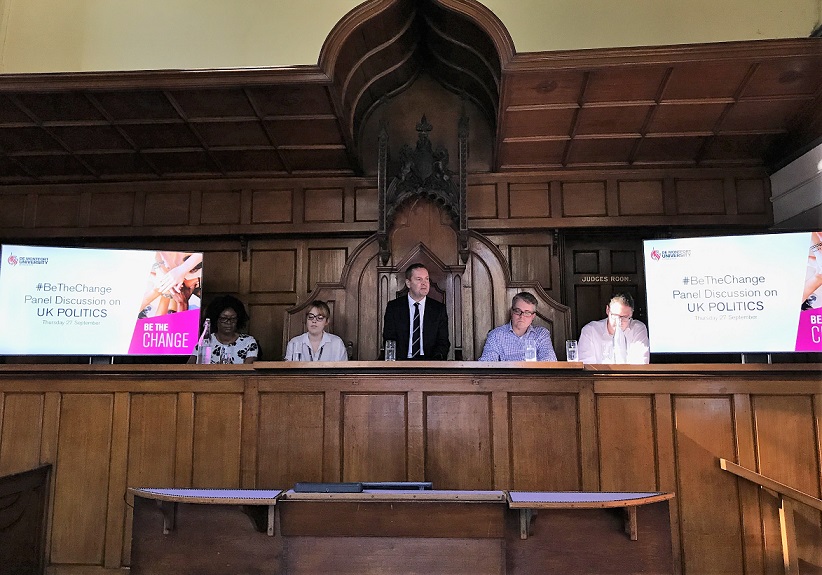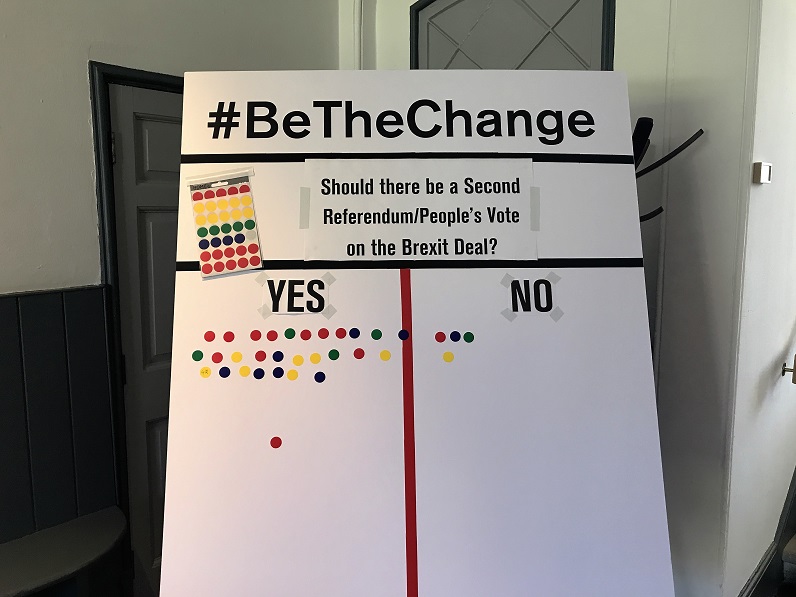Students and staff from De Montfort University Leicester (DMU) enjoyed a lively debate about Brexit at the latest Be The Change panel event.
A particular focus of this monthly political discussion was on the role of the media, with Leicester Mercury editor George Oliver and BBC Radio Leicester politics reporter Tim Parker featuring on the panel.

They were joined by Mollie Footitt of De Montfort Students’ Union and DMU’s Professor Bertha Ochieng to debate topics including the People’s Vote, Labour Party Conference and Conservative Party leadership.
The first item to be discussed was Theresa May’s so-called ‘Chequers deal’ for Brexit, with Tim Parker asking “if it isn’t Chequers, then what is it? What are the other practical options?”
He went on to argue that the Prime Minister needs to do more in order to ensure that her proposal can get through Parliament.
He said: “She needs to explain Chequers. Why isn’t she out there campaigning to show people that it’s the best thing for the country?”
The panel also debated whether there should be a People’s Vote, or second referendum, on the final Brexit deal.
George Oliver suggested that it was too early to say whether a People’s Vote would be the right thing to do: “We might get more clarity in the coming months, at the moment it is too early to say.”
Mollie gave a balanced argument for both sides of the debate. She said: “We’re two years down the line now and that means an extra 1.4 million people who are now at the age where they can vote.
“From the student side of it, having a second referendum would be useful because it doesn’t feel like enough has been done so far with the deadline being so close. But spinning that around because the deadline is so close, if we put all that energy into another referendum and the result is the same then where will we be come March next year?”
DMU student Thom Chapman gave a student perspective from the audience and argued that the Labour Party does have a strong and consistent stance on Brexit, but hinted that the party’s leadership does actually want Brexit to happen.

Professor Ochieng, who said that she originally opposed a second referendum on Brexit in the interests of democracy but has now changed her mind, called for a more joined-up approach from our politicians.
She said: “This shouldn’t be an issue for party political point-scoring because it affects us all. Cross-party agreement is needed, rather than Labour sitting back and using the Conservatives’ failings to get into power.”
The panel faced a number of questions relating to the role and responsibility of the media, with one audience member asking whether the media are failing to inform the public properly about complex issues such as Brexit.
Professor Ochieng said: “I do think the media have some responsibility but I also think that us as individuals have a responsibility to do our own research and analysis.”
Tim Parker said: “As someone who works for the BBC I have to address the needs of everyone and local press have that same responsibility. We have to dumb things down because if we go in to a story the wrong way you will switch off. How we tell the story is as important as what we’re telling.”
RELATED NEWS
Be The Change panellists discuss the implications of Brexit
Trump is unravelling the progress that Obama made, says DMU politics lecturer
George Oliver said that the media can’t assume that all of their audience are equally engaged on a certain subject, so they have to explain the subject to them in a way that will catch their interest.
He also argued that the public have a better opportunity than ever to access the information that they need.
He said: “I can confidently say that at no point in history has more public information been more readily available as it is online now for people to read in depth if they want to.
“Is it relevant for the media to do that or is it for journals and public bodies to publish their decision making? We report on it but we can’t report on it at the same length because people will switch off.”
Mollie addressed a question from a student in the audience about social media and ‘the scrolling thumb syndrome’, where people keep scrolling through their phone until they find some news that they don’t like.
She said: “What I personally do is not use social media as my source of news, I’ll use multiple different websites such as The Times, The Guardian and the BBC because I like to make sure there’s something to back up what I’m reading.”

There was disagreement about the extent to which people who voted to leave the European Union have changed their mind and would now prefer to remain.
While anecdotal evidence from audience members was backed up by Mollie’s assertion that many students have shifted their stance on Brexit, Tim Parker insisted that people he has interviewed in Leicestershire on both sides of the debate have only become more entrenched in their views.
Audience members were polled on whether there should be a second referendum on the Brexit deal, with a clear consensus from those in attendance that it was in the country’s best interests to put the final deal to the British public.
Professor Shellard also asked the audience to raise their hand if they believed that the Chequers deal would be voted through Parliament, with very few people backing Theresa May’s plan. However the room was far more split when asked the final question of the day, with around half of the audience indicating that they think Britain is now heading for a ‘hard Brexit’.
Posted on Friday 28 September 2018